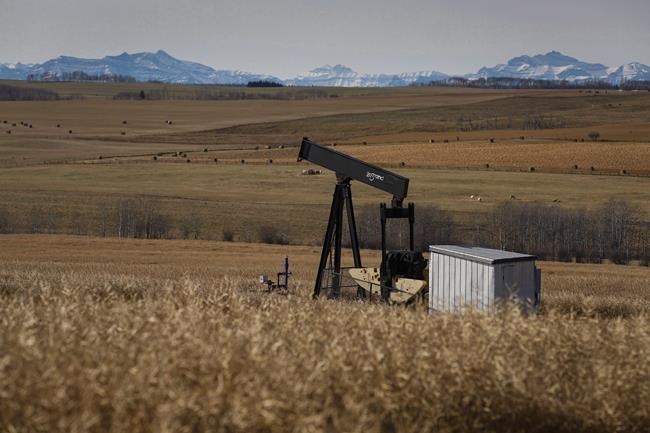Editor's note: Story has been updated throughout
CALGARY — Canadian oil wells will continue to be shut down amid weak global oil prices despite an agreement to limit production struck by OPEC and other major producers on the weekend, producers say.
The price of Western Canadian Select bitumen-blend oil rose by almost five per cent on Monday morning from Thursday's close, but remained stuck below US$5 per barrel as U.S. benchmark West Texas Intermediate oil prices inched up by an equally modest amount.
Both oil prices drifted lower through the day on Monday.
"It's all helpful but I still think we're in a very challenging situation," said Grant Fagerheim, CEO of Calgary-based Whitecap Resources Ltd., in an interview.
The agreement comes too late to allow a quick rebalance in the oil supply and demand market, he said, explaining that oil storage facilities have rapidly been filling while Saudi Arabia and Russia ramped up output after failing to reach an agreement to continue production limits in March.
The deal signed Sunday will result in a reduction of 9.7 million barrels per day of crude production in May and June and provides for lower reduction levels to follow.
Fagerheim said Whitecap is working on an analysis of all of its western Canadian wells to determine which are currently cash flow positive.
"If we have to pay to produce, we'll look to suspend that production," he said, adding shut-ins could start as soon as this weekend.
The Canadian industry has shut down operations producing about 400,000 bpd but Fagerheim said he expects that will more than double to as much as one million barrels per day — 20 per cent of the total — offline over the next few weeks.
The OPEC+ deal provides some assurance and stability to markets but it doesn't match the reduction in demand caused by measures taken to deal with the COVID-19 pandemic, said Kevin Birn, a Calgary-based oil market analyst at IHS Markit.
"The scale and the scope of this agreement is really a big deal," he said in an interview. "It is unprecedented ... but sadly, the demand destruction we're seeing is even greater.
"What that means is this doesn't solve the situation linked to the virus and the trajectory of the virus."
Global oil demand is expected to shrink by about 20 million bpd — one in five barrels of production — in the current month, IHS says in a forecast.
Canadian producers have already shut down wells accounting for about half a million barrels of oil per day because they can't make money at current prices, Birn added, and that trend will continue until global energy demand rebounds.
Oil producers will shut down their least profitable operations first, likely starting with heavy oil, where prices have been hit harder than light oil, said Jeff Tonken, CEO of Birchcliff Energy Ltd. and chair of the Canadian Association of Petroleum Producers.
"We're going to have forced shut-ins because the economics don't work," he said, while also predicting an eventual recovery.
"What will happen is demand will come back as people start to come out of their homes and as the economy starts to move."
Shale oil wells in the United States and Canada also produce natural gas. Tonken said a recent firming of natural gas contract prices likely results from expectations that associated gas output will fall as oil wells are shut down.
In a report updated on Sunday, Desjardins analysts said more than one million barrels per day of western Canadian oil production will probably be taken offline despite the OPEC deal.
"Some cuts are better than no cuts — that much is clear," the report notes.
"But when the 9.7 million bpd cut is put into the context of a 25 to 35 million bpd hit to global crude demand, it clearly is not enough."
This story by The Canadian Press was first published April 13, 2020.
Dan Healing, The Canadian Press




